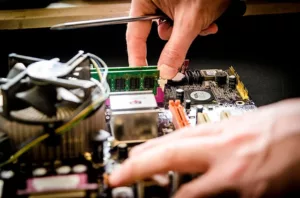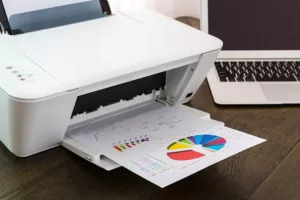How long can you make a motherboard last? What about hard drives? Here’s how to extend the life of your computer.
In an ideal world, your PC would last as long as you need it, and the only reason to get a new one would be for the performance boost. Unfortunately, life isn’t fair. PC parts die. Replacements can be expensive, so it makes sense to get the most out of every part you can. The most important thing you can do is maintain your PC components properly. A long-lasting PC starts and ends with good maintenance habits, especially when you build the PC yourself. To get started, check out these tips on how to extend the lifespan of your PC parts.
- Motherboards
Why Do Motherboard’s Die So Quickly?
Even though there are no moving parts, motherboards are very complex and delicate in their designs. As the focal point for everything else on your system, small malfunctions can have catastrophic effects. Motherboard lifespan is difficult to gauge, too, as accounting for individual user habits and local environments is almost impossible. Still, a 2018 Puget Systems study found that “while motherboards seem to be getting more and more complex,” the overall failure rate was just “2.1% or about 1 out of every 49 motherboards.” Importantly, this figure is “about half what we saw in 2017.” A 2016 HardWare.fr report returned similar results, with ASRock motherboards coming in at 1.45% and MSI coming in at 2.36%. The biggest reason for motherboard failure is that the capacitors deteriorate over time and become exhausted. Sometimes the capacitors will even leak, potentially damaging other hardware components. You can replace a capacitor, but it is a non-trivial DIY operation that you may be uncomfortable completing yourself. Other causes of motherboard failure include heat, static, and moisture.
Tips for Prolonging Motherboard Lifespan
Keep your computer away from environmental hazards like excess moisture or extra-dry air, which can promote static buildup. Excess heat can sometimes cause a motherboard to warp, leading to shorts and broken components. The best thing you can do to prevent motherboard failures is never to touch the motherboard. Obviously, you have to touch it to install or replace parts. Try to limit the motherboard’s exposure outside of the PC case. When you must touch the motherboard, be sure to ground yourself first, so you don’t accidentally shock and fry the motherboard itself. - Data Drives
Data drives come in two main forms: hard disk drives (HDDs) and solid-state drives (SSDs). A computer
cannot function without a disk drive, because that’s where the operating system resides. It’s crucial to your system.
If it dies, you’ll need to get a replacement ASAP.
Why Do HDDs and SSDs Die So Quickly?
HDDs and SSDs are both prone to failure, but for different reasons. HDDs are mechanical. They have moving parts and will physically break down over time. The platter might get scratched, the head might stop reading, or the parts might become “paralyzed” by a power surge. SSDs are based on flash memory chips, so they have no moving parts, however, they have unreliable long-term data retention, they are more susceptible to extreme temperatures, and power outages can lead to data corruption.
Tips for Prolonging Data Drive Lifespan
No matter which kind of data drive you have, it’s always a good idea to invest in a good surge protector.
Electrical surges can cause a lot of harm to all kinds of devices, not just PC parts. Avoid extreme temperatures when possible. Refer to your data drive’s manual for safe operating temperatures. This means cleaning dust out of your computer to ensure good air circulation and prevent overheating! Other than that, it’s mostly about buying a good model from a reputable brand. The next time you’re shopping for a data drive, check out our articles on some things to consider when buying a hard drive or a solid-state drive.
- Cooling Fans
You probably haven’t given your PC fans much thought. They spin up when you need them, and they spin down when you don’t. Sometimes, we don’t even notice when one stops working (at least, not straight away!). Fortunately, in most cases, cooling fans are relatively cheap to replace. The situation changes when you consider CPU cooling fans, which can be more expensive than their case cooling counterparts, and similarly, GPUs.
Why Do Cooling Fans Die So Quickly?
This one’s really simple. Just as with hard disk drives, cooling fans are mechanical—they have moving parts that are susceptible to general wear and tear. Over time, as the fans spin and spin and spin, they’re more likely to break down. But this process is accelerated by the dust and particles that build up on the fan blades and within the rotating mechanism. When exposed to heat and moisture, the dust can even get caked on and turn into gunk, which could cause more friction and stress.
Tips for Prolonging Cooling Fan Lifespan
The first tip for keeping any type of cooling fan working effectively is cleaning. That means cleaning the excess dust and buildup from fan blades, plus the dust from the PC case that contributes to the issue. You could also consider the location of your PC in your home. Leaving your PC on a thick carpet, for instance, can cause extra heat and additional dust ingress, in turn causing your fans to work harder to keep your system cool.
So, how often should you clean your cooling fans? If you’ve never cleaned them before, give everything
in your case a good clean. Then, head back one month later and see how much dust and buildup are
gathering on your cooling fan blades. You can gauge your PC cleaning schedule from there.
Need to get your computer fixed? Call Stacy (941) 246-1048; she can help.






